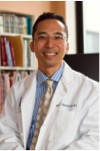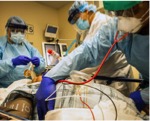
Apr 03, 2020
Robert Yanagisawa, President of the Japanese Medical Society of America (JMSA) who sees patients in New York, the world’s largest epidemic with COVID 19 infections, is a professor at Icahn School of Medicine at Mount Sinai. In an interview, he spoke of the current situation, and called for Japan’s urgent response. The questions and answers are as follows.
―What is the medical response
against COVID 19 in Mount Sinai Health System?
Our health system is comprised of eight hospitals with a total of 3000 beds, over
1700 patients are infected by COVID 19, and over 300 patients are in the
intensive care units (ICU). The number of new COVID 19 patients on March
27 was 1,000, but it has increased 1.5 times in just three days. We have
more than doubled hospital internal medicine teams taking care of these
patients, working on 12-hour shifts. As the number of patients is
expected to continue to increase in the future, dedicated units have been
increased throughout the hospital.
―Is medical
equipment sufficient? Is the medical system at it’s limit?

The ventilator is highly
in demand, but 400 new units have been procured. Protective equipment such
as masks and gowns are sufficient at present and all measures are in place to
protect our healthcare workers. If the number of critically ill patients
continue to increases rapidly, there is a risk of disrupting adequate medical
care. Only patients with moderate
to severe cases with low oxygen saturation levels are hospitalized. All
elective surgeries and procedures have been postponed to free up ICU beds.
– When do you expect to see the peak of
infection?
Our prediction model suggests that the infection peaks in the coming
weeks. Recently, the surge curve of the new COVID positive patients
requiring hospital admission is less steep than when it started. Effective vaccine
will not be available for long time and rate of infection has not hit it’s peak
yet. Several clinical trials are under way in our medical
university. Recently infected individuals have high titers of antibodies
against the new corona virus, and trials have begun to extract and administer
them to critically ill patients. Hopefully such therapeutic trials would
offer a breakthrough.
-Japan is also concerned about infection
resurge. What recommendations do you have as a healthcare professional in
New York?
New York was virtually unaffected until a month
ago. CIVUD 19 is highly infectious and the situation changes
dramatically. Large cities such as Tokyo have such an element. Precautionary
measures must begin early. First of all, it is important to stay home and
stop the spread. Also important, a crisis management plan for the spread
of infection. It is necessary to have a realistic plan on how to increase
the number of beds, and to secure personnel that can help manage medical
facilities. It is imperative that a system be developed as soon as
possible, such as reallocating medical personnel across country to the areas
with high demand, reinstatement of medical staff who have recently retired or
those who have left work after maternity leave.

